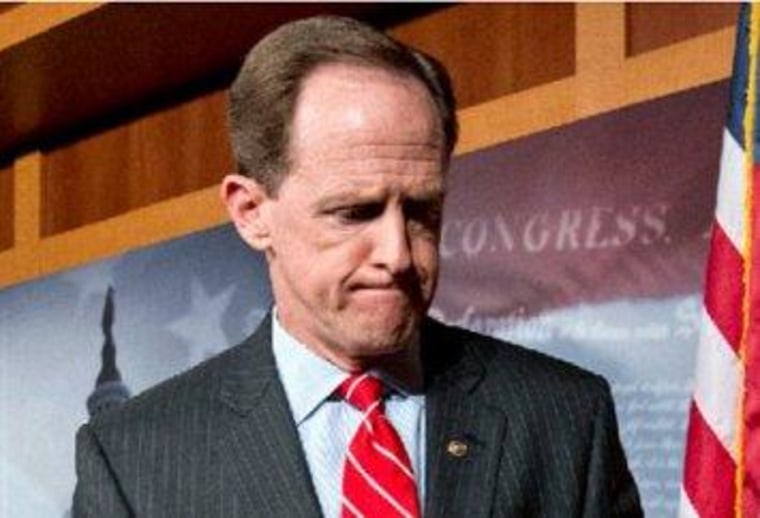We talked at length yesterday about the failure of the Transportation and Housing and Urban Development (or "THUD") appropriations bill in the House -- a move that sent the Republican budget process into chaos -- so it's only fair to note what happened to the Senate version of the same bill.
In short, nothing good.
Early on Thursday afternoon, a few hours before the start of a month-long summer recess, the U.S. Senate held a doomed vote on a $44 billion package of transportation and housing funds. The vote was 54-43, six short of cloture, most Republicans making sure that the bill with the accidentally perfect name of THUD (Transportation, Housing, and Urban Development) went down in flames for now.Pennsylvania Sen. Pat Toomey, whose work on a gun control amendment this year gave him the temporary glow of a centrist, walked from the Senate to a special, open live-streamed meeting of the Republican Study Committee, all about the Obama administration's scandals. Anyone watching the Tea Party Patriots-sponsored feed could hear Toomey tell a colleague that "we did something constructive today" in the Senate."We denied cloture on the THUD bill," said Toomey. "I told you we'd kill it, and we did."
We talk from time to time about the post-policy nihilism that's come to define so much of Republican politics, and this is rather striking example.
The Senate's THUD bill was expected to pass with relative ease. It had bipartisan support; it was pulled together responsibly; and it sailed through the committee process as non-controversial bills should. As Joan McCarter explained, "The transportation funding bill has always been a non-controversial, reliable bipartisan effort, because there was something tangible in it for every member of Congress to take home: jobs, infrastructure improvements, a display of federal dollars at work for their constituents. That's all changed."
And not for the better.
After the House Republicans killed their own version of the bill, GOP leaders feared a moderate, bipartisan THUD package would give Senate Dems the upper hand in a conference committee. What's more, Senate Minority Leader Mitch McConnell (R-Ky.) was eager to prove how right-wing he is to conservatives back home, so he lobbied Republicans who supported the bill to change their mind.
The result? A bill that was supposed to be approved easily was killed with a filibuster -- which in Pat Toomey's mind, is evidence of doing "something constructive."
The larger point, of course, is that policymakers used to have a less ridiculous definition of what "constructive" means. Not too long ago, members of Congress used to think they did "something constructive" when they, you know, passed a bill. Or maybe reached a compromise. Or perhaps struck some sort of deal.
The hallmark of post-policy nihilism is the belief that policy outcomes and substantive governing are largely irrelevant. Officials have begun defining themselves solely by what they can block and destroy, rather than what they can accomplish, even if that means opposing what they support.
And that's not good.
What's more, as McConnell panics about his re-election bid, this dynamic is likely to become more common. Yesterday, for example, Sen. Susan Collins (R-Maine) hoped to see the Senate pass the bipartisan bill, but quickly found herself on the losing side of a McConnell broadside.
Sen. Susan Collins of Maine, the top Republican on the panel that wrote the $54 billion transportation bill, appeared to grope for an explanation for why Minority Leader Mitch McConnell (R-Ky.) worked so hard to kill her legislation.Asked if McConnell's upcoming primary fight with a tea party challenger might have something to do with the pressure, Collins told POLITICO: "I can't speculate on why. All I can tell you is he has never worked harder against a member of his own party than he did against me today."
For context, note that Collins and McConnell have worked together for 16 years -- and she's "never" seem him work this hard to beat another Republican.
